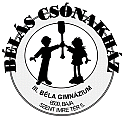





 RSS hГrek RSS hГrek
 Webmester Webmester
   BГ©lap 





E-KRÉTA HELP E-KRÉTA E-ÜGYINTÉZÉS  |
Information
Bela III Grammar School in Baja is celebrating the 250th anniversary of its
establishment.
The school was established by the town and the Franciscan Order in 1757. From
the 1879/80 academic year the Cistercian Order took over the management of the
school.
In 1921, on the instructions of the abbot of Zirc, it adopted the name of King
Bela III, who settled the Cistercian Order in Hungary. In 1948 the school was
brought under state control and later under local government control.
Since its establishment the institution has been the intellectual centre of
Baja. Currently there are four-, five- and six-year teaching programmes.
Students can opt for specialisations in Mathematics, Art subjects (e.g. media,
communication, etc.), or Information Technology.
Both teachers and students give priority to
- knowledge
- creativity
- competitiveness
- healthy lifestyle
- ability of cooperation
- traditionalism
Our aim is to provide the students with high standard
education and to help them develop up-to-date and extensive general knowledge. Our
aim is to form our students' human and moral attitude through both individual
and collective education. We care about the traditions of the school. Year by
year we organize our traditional ball of the freshman students, the school
leavers' ball, a music afternoon and theatre performances.
Our primary aim - expressed by parents, students and teachers
- is to prepare our students for tertiary education. 90% of our students
have gained admission to different universities in the last years.
What it is like being "bГ©lГЎs"
BГ©la III Grammar School, which I have attended for three years, is somehow totally different from the other secondary schools in Baja. Since I started going there I have felt that I also differ from other students who are at my age. Any time I walk down a crowded street wearing my school's uniform, I can see that people stare at me in an incredibly strange way. It is also very interesting what happens if someone gets to know that I'm at this school. 'And which shool do you go to?' - this is among the first five questions I am asked when I'm talking to somebody I've never talked to before. After my answer the reaction is always the same: 'Are you so clever?' I don't know where this rumour comes from. In Baja and the nearby towns and villages everyone says that BГ©la III Grammar School is an elite school with elite students and lots of eager beavers. Everyone, except those seven hundred people who attend this school. :) On behalf of my schoolmates I can confirm that our "famous" grammar school doesn't differ from any other schools at all. Well, ok I must admit that it's not easy to be accepted, and if you want to get good marks you have to work hard, but if we leave these things out of consideration, there's really nothing special about the "famous" BГ©la.
How a schoolyear goes on
Just like everywhere else, a schoolyear starts
on 1st September and finishes in the middle of June. During the year we have
three longer holidays: one week in autumn, about 10 days (or sometimes even two
weeks) in winter and 5-6 days in spring.
We have to go to school five days a week. Our lessons start at 8 o'clock in the
morning, but some of us may also have a zero lesson, which begins at quarter
past seven. The lessons are 45 minutes long. Between two lessons we have a
break of 10 minutes but after the third lesson the break is a bit longer so
that we can have breakfast. We usually have six lessons a day. However, at the
age of 16 we have to take up additional lessons in the subjects we need for our
future, and these lessons are mainly in the afternoon, which makes a usual schoolday even longer.
Every year in October there is a ball organised for the freshman students to
initiate them into the school. Before the beautiful ball-opening dance there is
a humorous performance (with teacher parodies) prepared and performed by year
eleven.
Another important event is the school leavers' ball, which is usually held in
January. Every school leaver is presented with a light blue ribbon with the
school's name and two dates of year on it (which shows when they started and
finished school).
In addition, during the schoolyear we commemorate the public holidays of
Hungarian history.
After-school activities
Although we have to (or should...) learn quite a lot, in the afternoons we can be involved
in a lot of different after-school activities. For example, there are very good
facilities for singing. In addition, the school has a radio system as well as a
drama club for the students who like acting in plays.
The music life in BГ©la III
In BГ©la III Grammar School the music life has got different areas. If you come
to this school with a nice voice or you can play on any musical instuments, you
have got a lot of opportunities to show your ability.
There are two choirs in which you can sing. One of them is the girl-choir.
There are nearly sixty girls in it. The choir has received a lot of rewards and
it is quite famous in the county. They rehearse in the seventh lesson on
Thursdays. Their repertoir consists of classical and popular music. The other
choir is called Teacher-Student Singers. There you and your teachers can sing
together.
If you like folk music, you can join the "VadvirГЎg" folk song group.
They have their own traditional costume and they have to learn how to sing in a
loud voice without any sore throat. They have received rewards too and some of
the members have their own career as a folk singer.
If these things are not enough for you, there is still another choice. You can
sing musicals alone in the drama club with OttmГЎr Attila. You can learn the
most important practics how to sing and you are able to go to performances in
the theatre. If you can play on a musical instrument you can join one of the
bands. They are organised and led by the students.
After you have decided where to go, you can show yourself on one of the most
popular organisations, the music afternoon. It is usually held in the gymnasium
of EJF GyakorlГі primary school in March or April. There you can find everybody
who has a contact with music. In addition to the choirs, the bands and the groups
there are solists and dancers as well who choose this event to show their
abilities. The repertoir is always very colourful and it can exactly show the
music life of BГ©la III.
The technic
Besides I learn at BГ©la III Grammar School, I'm a member of an admirable group
at school, the technical staff. We run the studio. We have got a head teacher
and a head student, they are the directorate of the studio.
On average schooldays our task is to run the school radio in the breaks.
Meanwhile, if something doesn't work (e.g. a video
recorder, a DVD player, a casette recorder, etc.) we have to go and repair it
or change it to another that works.
Every year there are some bigger events that need a little bit more work.
The newcomers' ball in October is the most difficult and tiring thing for us.
We always have to divide the staff into three groups: one for the sound
technic, one for the light technic and one for the video technic (cameras, DVD
and VHS records, etc.)
Another important event is the school leavers' ball in January. It is also
difficult, but a bit easier than the previous.
The opening and closing ceremonies of the schoolyear are the easiest events.
They are as good as rest for us.
In addition to the work at school, sometimes we are asked to go to work in the
local theatre.
Although we have to work hard and a lot, we like the studio because we can try
ourselves in different situations and we can learn things that differ from what
we are taught at school.
Piukovics ГЃgnes
PethЕ‘ Dorottya
Karagity IstvГЎn
|
8,416,703 látogató, 10,384,296 látogatás, 12,049,371 oldalletöltés Designed & coded by Makaji Máté & Nagy Károly |
Bajai III. Béla Gimnázium, 6500 Baja, Szent Imre tér 5. Az intézmény kötelező nyitvatartási ideje: 7:00 - 18:00 Tel./Fax: +36-30-781-0664 vagy 06-79-325-642 e-mail: titkar@bajabela.hu |


